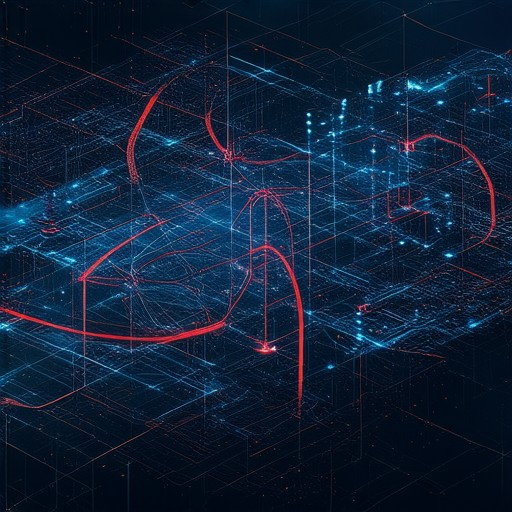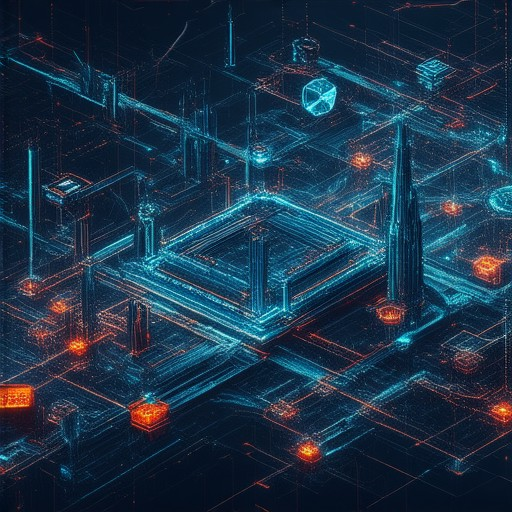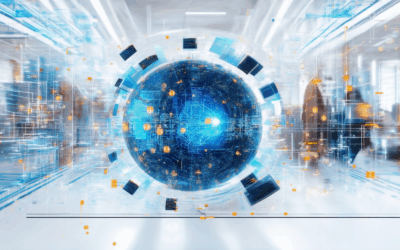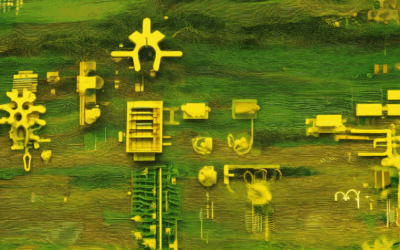As we step into 2023, the pace of technological innovation continues to accelerate, offering unprecedented opportunities for growth across industries. Emerging technologies are reshaping the way we live, work, and interact, creating a dynamic landscape filled with possibilities. From revolutionizing farming practices through cutting-edge agricultural innovations to transforming education with forward-thinking edtech solutions, these advancements are driving progress like never before. Businesses are harnessing new tools to streamline operations, while healthcare is on the brink of groundbreaking breakthroughs. As we look ahead to 2025 and beyond, one thing becomes clear: the integration of emerging technologies holds the key to unlocking sustainable growth and fostering innovation across the globe.
Key Takeaways
- Artificial Intelligence (AI) revolutionizes industries with advancements in natural language processing and automation.
- Quantum Computing promises to solve complex problems exponentially faster, impacting cryptography and drug discovery.
- Blockchain Technology extends beyond finance to secure decentralized systems for supply chain and identity verification.
- Internet of Things (IoT) drives efficiency in smart homes, cities, and industrial systems.
- Augmented Reality (AR) and Virtual Reality (VR) transform education, gaming, and remote work with immersive experiences.
- Renewable Energy Innovations make clean energy more accessible and cost-effective.
- Biotechnology and Synthetic Biology unlock innovative solutions in medicine and agriculture.
- Space Exploration and Colonization pushes boundaries with private company initiatives.
- Cybersecurity Innovations combat rising threats with AI-driven threat detection.
- Web3 and Decentralized Applications redefine internet architecture and empower users.
- Metaverse and Virtual Worlds blend physical and digital realities for enhanced interactions.
- 6G Technology enables faster connectivity, supporting IoT, autonomous vehicles, and remote surgery.
- Autonomous Systems and Robotics enhance efficiency in logistics and manufacturing.

Next Booming Technologies
- Artificial Intelligence (AI)
- Quantum Computing
- The Metaverse
- Web3 and Decentralized Technologies
- Bioengineering and Synthetic Biology
- Clean Energy and Sustainability
- Space Exploration and Colonization
- Advanced Materials Science
- Internet of Things (IoT)
AI continues to revolutionize industries through advancements in machine learning, natural language processing, and autonomous systems.
Generative AI tools are transforming content creation, while autonomous vehicles are leading the charge in transportation.
AI-driven healthcare innovations are enabling personalized medicine and early disease detection.
Quantum computers promise to solve complex problems exponentially faster than classical computers, revolutionizing fields like cryptography and drug discovery.
Virtual reality (VR) and augmented reality (AR) are merging physical and digital worlds, creating immersive experiences for work, gaming, and education.
Metaverse platforms are becoming hubs for social interaction and virtual collaboration.
Blockchain technology is reshaping finance with cryptocurrencies and decentralized applications, while non-fungible tokens (NFTs) are redefining digital ownership.
Decentralized finance (DeFi) platforms are disrupting traditional banking systems.
CRISPR technology and synthetic biology are unlocking the potential to design organisms with tailored traits, leading to breakthroughs in agriculture and medicine.
Solar and wind energy innovations are driving the global shift toward renewable energy sources, while carbon capture technologies aim to mitigate climate change effects.
Sustainable materials and circular economy principles are transforming manufacturing processes.
Commercial space travel companies are making space exploration accessible to civilians, while asteroid mining ventures aim to harvest valuable resources from space.
Space-based solar farms could soon become a reality, providing limitless energy to Earth.
Boron nitride and graphene are emerging as super材料 with exceptional properties, enabling next-generation electronics and composite materials.
Self-healing materials are revolutionizing construction and electronics by reducing waste and extending product lifespans.
Smart devices are integrating into everyday objects, creating connected ecosystems for homes, cities, and industrial applications.
IoT security improvements are addressing vulnerabilities to protect data and infrastructure.
What is the Fastest Growing Technology?
The fastest growing technology is Artificial Intelligence (AI) and Machine Learning, which continues to advance rapidly across industries. Here’s a breakdown of the key technologies making significant strides:
- Artificial Intelligence (AI): AI is revolutionizing fields like healthcare, autonomous vehicles, and customer service. Tools like chatbots, recommendation systems, and natural language processing are becoming increasingly common.
- Quantum Computing: This emerging technology has the potential to solve complex problems much faster than traditional supercomputers, with applications in cryptography and drug discovery.
- Blockchain Technology: Known for powering cryptocurrencies like Bitcoin, blockchain is also being used in supply chain management, decentralized finance (DeFi), and voting systems.
- Internet of Things (IoT): The connected devices revolution is transforming smart homes, industrial automation, and healthcare monitoring.
These technologies are driving innovation and efficiency across various sectors, making them essential to keep an eye on for future trends.
For more insights into how these technologies are shaping the future, explore our articles on digital transformation and tech trends .

The Essential 8 Emerging Technologies
The technology landscape is rapidly evolving, driven by groundbreaking innovations that are reshaping industries and enabling new possibilities. Here are the 8 essential emerging technologies that are leading the charge:
- 1. Artificial Intelligence (AI)
- 2. Internet of Things (IoT)
- 3. Blockchain
- 4. Virtual Reality (VR)
- 5. Augmented Reality (AR)
- 6. Advanced Robotics
- 7. Quantum Computing
- 8. Neuromorphic Computing
AI has come a long way since its early days, now encompassing machine learning, natural language processing, and advanced algorithms. From healthcare diagnostics to autonomous vehicles, AI is revolutionizing how we live and work.
The Internet of Things continues to connect billions of devices, enabling smart homes, cities, and factories. IoT’s integration with AI and cloud computing is unlocking unprecedented opportunities for efficiency and innovation.
Blockchain technology is disrupting various sectors, from finance to supply chain management. Its decentralized nature and security features make it ideal for transactions and data integrity.
Virtual reality is immersive and interactive, finding applications in gaming, education, and training simulations. VR is also being explored in healthcare for patient care and rehabilitation.
AR overlays digital information onto the physical world, making it perfect for industries like retail, manufacturing, and construction. AR is increasingly being used for hands-free operations and enhanced decision-making.
Robots are becoming more intelligent and versatile, with applications in manufacturing, delivery, and healthcare. Collaborative robots (cobots) are particularly impactful, working alongside humans in diverse settings.
Quantum computers promise to solve complex problems exponentially faster than classical computers. They hold the potential to revolutionize fields like cryptography, drug discovery, and optimization.
Neuromorphic computing mimics the human brain’s structure and function, offering energy-efficient solutions for AI tasks. This technology is particularly useful for edge computing applications.
These technologies are not just trends—they are transformative forces shaping our future. By staying informed about these innovations, businesses and individuals can leverage them to drive progress and create value.

The Top 13 Emerging Technologies of 2025
As we move into 2025, the technological landscape continues to evolve rapidly, bringing groundbreaking innovations that promise to reshape industries and everyday life. Below is a curated list of the most promising emerging technologies:
-
1. Artificial Intelligence (AI)
AI continues to revolutionize various sectors, from healthcare to transportation. Advances in natural language processing (NLP) and machine learning are enabling smarter automation and personalization across industries.
-
2. Quantum Computing
Quantum computers are poised to solve complex problems exponentially faster than classical computers, with potential applications in cryptography, drug discovery, and optimizing global supply chains.
-
3. Blockchain Technology
Blockchain is moving beyond financial transactions to encompass decentralized systems for identity verification, supply chain management, and even voting systems, offering increased security and transparency.
-
4. Internet of Things (IoT)
The integration of IoT devices into smart homes, cities, and industrial systems is driving efficiency and innovation, enabling real-time monitoring and automated decision-making.
-
5. Augmented Reality (AR) and Virtual Reality (VR)
AR and VR are transforming education, gaming, and remote work, providing immersive experiences that bridge physical and digital worlds, enhancing productivity and entertainment.
-
6. Renewable Energy Innovations
From solar panels to wind farms, advancements in renewable energy technologies are making clean energy more accessible and cost-effective, accelerating the global shift toward sustainability.
-
7. Biotechnology and Synthetic Biology
Synthetic biology is unlocking the potential to design and engineer organisms for medical, agricultural, and environmental purposes, offering innovative solutions to global challenges.
-
8. Space Exploration and Colonization
Private companies are leading the way in commercial space travel, with plans for lunar bases and Mars colonization, pushing the boundaries of human exploration and settlement.
-
9. Cybersecurity Innovations
Rising threats require advanced cybersecurity measures, including AI-driven threat detection, quantum-resistant encryption, and better data protection protocols to safeguard sensitive information.
-
10. Web3 and Decentralized Applications
Web3 is redefining internet architecture through decentralized applications, tokenized economies, and user-owned platforms, challenging traditional models and empowering individuals.
-
11. Metaverse and Virtual Worlds
The metaverse is becoming a hub for social interaction, virtual workspaces, and digital events, blending physical and virtual realities to create immersive experiences.
-
12. 6G Technology
Next-generation 6G networks are expected to revolutionize connectivity, enabling faster speeds, lower latency, and more reliable communication, supporting emerging technologies like autonomous vehicles and remote surgery.
-
13. Autonomous Systems and Robotics
Autonomous robots and self-driving systems are being deployed across industries, from manufacturing to delivery services, enhancing efficiency and safety through intelligent automation.
What is Hot in Tech Right Now?
Tech is evolving rapidly, with several emerging trends shaping the industry. Here are some of the most notable developments:
- Artificial Intelligence (AI): AI continues to dominate the tech landscape, with advancements in machine learning, natural language processing, and automation. Companies like OpenAI are pushing the boundaries, enabling applications in healthcare, finance, and more.
- Quantum Computing: Quantum computers, led by companies like IBM, are promising to revolutionize fields such as cryptography, drug discovery, and optimization. Their potential to solve complex problems exponentially faster than classical computers is immense.
- Blockchain Technology: Beyond cryptocurrencies, blockchain is being adopted in supply chain management, decentralized finance (DeFi), and non-fungible tokens (NFTs). Platforms like Hyperledger are driving its adoption across industries.
- Virtual Reality (VR) and Augmented Reality (AR): VR and AR are gaining traction, with devices like Oculus and Apple’s AR glasses becoming more accessible. These technologies are being utilized in gaming, education, and industrial training simulations.
- Cybersecurity: As connected devices grow, cybersecurity threats increase. Companies like CrowdStrike are leading innovations in AI-driven threat detection and response, protecting sensitive data in a zero-trust framework.
- Space Exploration: Private companies such as SpaceX are making significant strides in space travel, launching satellites and conducting crewed missions. This resurgence is driving advancements in satellite communications and space infrastructure.
- Biotechnology: Breakthroughs in gene editing, particularly with CRISPR-Cas9, are paving the way for new disease treatments and agricultural innovations. However, ethical considerations remain a focal point.
- Autonomous Vehicles: Self-driving technology, spearheaded by companies like Waymo, is advancing rapidly, relying on AI and sensor networks to enhance safety and efficiency in transportation.
- Cloud Computing: Cloud services remain foundational to modern tech, with AWS, Azure, and Google Cloud continuously innovating to meet the demands of hybrid and multi-cloud environments.
- Sustainability in Tech: Eco-conscious practices are gaining momentum, with companies prioritizing renewable energy in manufacturing and developing energy-efficient hardware to reduce their environmental impact.
These trends reflect the tech industry’s commitment to innovation, with each advancement intersecting and influencing others. Staying informed about these developments is crucial for anyone looking to navigate the ever-evolving tech landscape.

What Technology Will Change Your Life in 2025?
The year 2025 promises to bring groundbreaking technological innovations that will reshape daily life, work, and societal interactions. Here are some key technologies expected to have a transformative impact:
- Quantum Computing: By 2025, quantum computers are projected to solve complex problems exponentially faster than classical computers, revolutionizing fields like cryptography, drug discovery, and artificial intelligence.
- Artificial Intelligence (AI): Advances in AI will lead to smarter systems capable of autonomous decision-making, personalized education, and improved healthcare diagnostics. The development of General AI (AGI) may still be years away, but significant milestones are anticipated.
- Bioengineering and Biotechnology: Technologies like CRISPR-Cas9 and gene editing will continue to evolve, enabling precise modifications to DNA, paving the way for personalized medicine and combating diseases effectively.
- Neurotechnology: Breakthroughs in brain-computer interfaces (BCIs) will enhance human capabilities, allowing for direct communication between the brain and external devices, leading to new possibilities in education, gaming, and rehabilitation.
- Blockchain and Decentralized Finance (DeFi): The continued growth of blockchain technology will solidify its role in financial systems, enabling decentralized applications and disrupting traditional banking and financial services.
- Renewable Energy Storage: Innovations in battery technology, such as solid-state batteries, along with advancements in fusion energy, will make renewable energy more accessible and cost-effective, accelerating the global shift toward sustainable energy sources.
- Space Exploration: Commercial space travel will become more accessible, with companies like SpaceX and Blue Origin pushing the boundaries of space exploration, potentially leading to the colonization of Mars or nearby planets.
- Autonomous Systems: Autonomous vehicles, drones, and robots will continue to dominate logistics, transportation, and manufacturing, reducing human error and increasing efficiency in various sectors.
- 6G Networks: The rollout of 6G networks will enable faster data transfer rates and lower latency, supporting the development of connected devices and enhancing applications in IoT, remote surgery, and virtual reality.
These technologies collectively promise to enhance human life by solving pressing global challenges and creating new opportunities for innovation and growth. As we approach 2025, staying informed about these advancements will be key to understanding how they will shape our future.




0 Comments